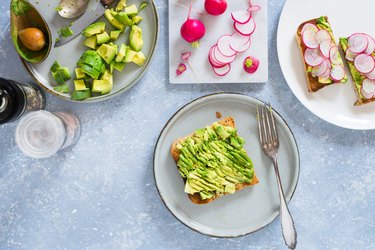
High-fat fruits and vegetables are a nutritious addition to any diet. Vegetable fat and fat from fruit may have a much different effect on your health than animal fats from meat and dairy products.
What is Vegetable Fat?
Video of the Day
When you think of fat in foods, cheese, meat, dairy and other animal foods probably come to mind. But there are many fruits and vegetables with fat — sometimes in large quantities. Although the predominant type of fat in fruits and vegetables is healthy monounsaturated fats, there is also some saturated fat in fruit.
Video of the Day
Whether or not saturated plant fat is as bad for you as the fat in animal products is hotly debated, but limiting how much you eat is still recommended.
List of Plant-Based Fats
The beauty of plant-based fats is that they come in many varieties. Most plant fats come from fruits, but there are some sources of vegetable fat you can eat more of.
1. Avocado
Avocados are considered fruits, and they're pretty high in plant-based fat. Creamy avocados have 30 grams of fat per fruit, according to the USDA.
The fat in avocados is mostly monounsaturated fats, with small amounts of polyunsaturated and saturated fats.
Avocados are a rich source of many essential vitamins and minerals, such as vitamin B6, vitamin C, vitamin E, potassium, magnesium, folate, and fiber. Avocados are commonly eaten in dips, but they can also be sliced on top of sandwiches and salads.
2. Olives
Olives provide a significant amount of vegetable fat, and are high in monounsaturated fats.
When olives are pressed and used to make olive oil, all the nutritious fats are retained. Olive oil is considered to be high in healthy fats and is often recommended as a part of a heart-healthy diet. The traditional Mediterranean diet, in particular, touts the use of olive oil to get more healthy unsaturated fats.
Drizzle olive oil on top of salads or add it to sauces to up the healthy fats to your diet.
3. Coconuts
Coconuts are high in fat, with almost 29 grams of total fat in a 1-cup serving, per the USDA. Most of the fatty acids in coconut are saturated fat, but they also have small amounts of monounsaturated and polyunsaturated fat.
Coconuts are a good source of other vitamins and minerals like manganese, copper, magnesium, zinc and iron.
You can get more of the fat from coconuts by adding coconut oil to meals like smoothies and coffee, or by cooking with coconut milk or cream.
Tip
There isn't enough long-term evidence to know for sure whether tropical oils, like coconut oil, are healthy, unhealthy or neutral, according to Berkeley Wellness.
While research continues, they recommend only using coconut oil occasionally and choosing vegetable oils such as olive oil for regular use, as it is low in saturated fat.
4. Nuts and Seeds
Nuts and seeds are generally high in plant-based fats as well as other nutrients. Some nuts and seeds, such as pistachios, have more fat than others, but they all provide significant amounts of monounsaturated fats and polyunsaturated fats.
Eaten in moderation, nuts and seeds are linked to reduced levels of bad cholesterol, and are considered a nutritious snack, according to the American Heart Association (AHA).
Nuts and Seeds High in Fat
- almonds
- brazil nuts
- pecans
- walnuts
- sunflower seeds
- chia seeds
5. Nut and Seed Butter
Nut butter, which is made by grinding nuts into a creamy texture, contains a significant amount of plant fats.
Peanut butter, for example, has around 16 grams of plant-based fat per serving. Most of the fat comes in the form of unsaturated fat, but a small amount is from saturated fat.
6. Soybeans
Some members of the legume family boast higher amounts of plant fat than other vegetables. Soybeans, for example, are another great source of plant-based vegetable fat.
In 1 cup of cooked green soybeans, you'll get 12 grams of fat, and only 1.3 grams come from saturated fat. Soybeans are a good source of other nutrients like fiber, vitamin c, zinc and magnesium.
7. Vegetable Shortening
Vegetable shortening is an ingredient that's commonly used in baked goods. Most shortening is made from vegetable oils like soybean, cottonseed, or palm oil, though it can also be made from animal fat. Vegetable shortening often has high amounts of fat.
Vegetable shortening used to have some trans fat, but because the FDA banned trans fat in 2020, it now usually just consists of saturated fat. That's because shortening is made using hydrogenation — a process in which hydrogen molecules are added to vegetable oil so that it becomes solid at room temperature, according to January 2017 research in Critical Reviews in Food Science Nutrition.
Benefits of Plant Fat
Mono- and polyunsaturated fats, like those from fruit and vegetables, have been linked to lower LDL (that's the bad one) cholesterol levels, higher HDL cholesterol levels and a reduced risk of heart disease, according to Harvard Health Publishing.
Avocados are one of the richest sources of monounsaturated fats among all foods; polyunsaturated fats are abundant in fatty fish, such as tuna, salmon and mackerel; walnuts; and flaxseeds.
Eating too much of the saturated fat found in meats, butter, lard, cream and cheese is linked to higher LDL cholesterol, increasing the risk of heart disease, per the American Heart Association. People are encouraged to eat less of these unhealthy fats, and replace them with healthy, plant-based fats.
Was this article helpful?
150 Characters Max
0/150
Thank you for sharing!
Thank you for your feedback!